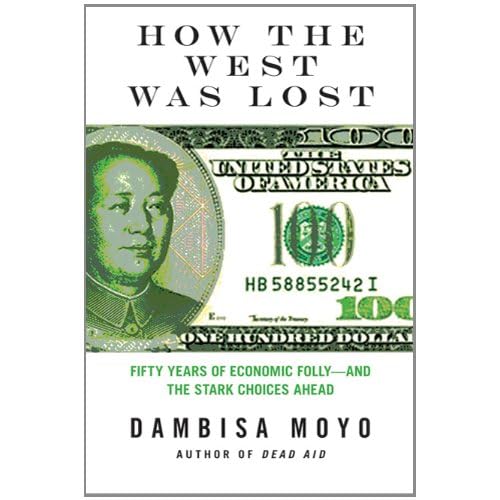 After her bestseller "Dead Aid", Zambian author Dambisa Moyo has presented her second book, "How the West was Lost: Fifty Years of Economic Folly--and the Stark Choices Ahead".
After her bestseller "Dead Aid", Zambian author Dambisa Moyo has presented her second book, "How the West was Lost: Fifty Years of Economic Folly--and the Stark Choices Ahead".While "Dead Aid" was entirely focused on development in Africa, Moyo now turns to the industrialized West and diagnoses it with 50 years of paralysis.
Working along the terms capital, labor and productivity, Moyo says that the West and in particular the US (but also the UK) have failed in all three regards.
- With regard to capital, the US went deeply into debt by borrowing from China and investing into housing.
- As far as labor is concerned, Moyo holds that Western pensions, health care and education are seriously underfunded, and disregarded in the democratic four-year cycles of most Western countries.
- Productivity gains in the West, finally, have stayed far below those in China. Western countries do not try to use education to produce higher-quality products and services, but fail to reform their systems, meaning that they are headed to compete with China on the same playing field: labor cost.
If you want to listen to the full speech that Moyo recently gave at the LSE, you can do so here:
Picture Source: Amazon
Well, it is kind of obvious if there is no nationwide consensus, then the reform of the welfare state is politically impossible in the current system. Call me crazy but that is why I'm strongly against the democratization of the EU, so there would be actually an entity in Europe which can make politically sensitive decisions. That is another question that social policy is not harmonized on the EU level but I'm afraid we will see a lot of Greece in the upcoming decade. No wonder that one of the priorities of the Hungarian presidency is to actually strengthen EU supervision of the fiscal policy.
ReplyDeleteGabor, I think you're touching upon the basic problem of democracy. Why does it not go into the head of the other 55% of citizens in my country that I AM RIGHT? Why do I have to listen to them?
ReplyDeleteAnd of course, in Europe it is even more difficult to respect everybody's opinions, with that complicated network of subsidiarity, competences, regulations, directives, the Council, Commission and the Parliament in place.
I'm in favor of voluntary participation, where interested citizens can opt in on policies via online consultation where they like. Blogging and social media are such a case, and the EU is getting more and more interested to explore this option. I don't think it can replace the traditional structures of democratic representation. But it can help citizens to feel more included into policy-making, and subsequently take possession of particular policy issues.
If that can always guarantee a consensus - I don't know. But I think it is a step in the right direction.